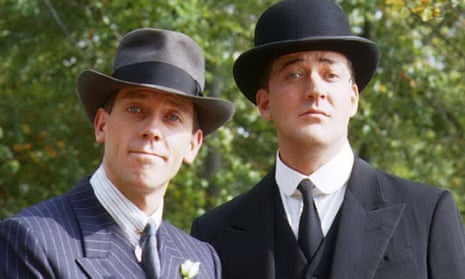According to Evelyn Waugh, “Mr Wodehouse’s idyllic world can never stale. He will continue to release future generations from captivity that may be more irksome than our own.” He has certainly continued to release future generations from the irksome captivity of writing as themselves. Following in what he calls “the patent-leather footsteps of the greatest humorist in the English language”, Ben Schott of the Schott’s Miscellanies fame has written a homage to everyone’s favourite Wodehouse creations, Jeeves and Wooster. (He’s not the first: Sebastian Faulks had a go in 2013, in Jeeves and the Wedding Bells.) The book, we are told, is “Authorised by the PG Wodehouse Estate”, which is certainly reassuring – but is it any good? The stakes are high. Fond pastiche or parody? A novel or a novelty?
The challenges are considerable, for Wodehouse was possessed of what one might justifiably describe as a unique prose style – loose, allusive, zippy, zingy, packed full of slang and overflowing with elaborate metaphors and similes, not to mention endless puns, wordplay and wisecracks. Every sentence is a performance. In 1949’s The Mating Season, for example, Rev Sidney Pirbright, vicar of King’s Deverill and uncle of “Catsmeat” Potter-Pirbright, is described as “a tall, drooping man, looking as if he had been stuffed in a hurry by an incompetent taxidermist”. He “was not one of those boisterous vicars who, when opening a village concert, bound on the stage with a whoop and a holler, give the parishioners a huge Hallo, slam across a couple of travelling-salesman-and-farmer’s-daughter stories and bound off, beaming”. The general effect is of being force-fed golden sugar cubes.
Schott certainly puts on a bravura performance, twirling and twinkling with tremendous energy. A typical paragraph runs like this:
A thought struck me, the way they do when the filbert is whirling. Monty hailed from one of the finest families; he had an accent fruity enough to spread on a muffin, and his fondness for double-breasted suiting meant he was rarely dressed in anything less than a full acre of tweed. I knew for a fact that the dinner jacket in which he was currently attired had been bespoken on Savile Row, no less, for I was with him at its bespeaking.
If you like this sort of palaver, you are going to love Jeeves and the King of Clubs: 300 pages of non-stop high jinks. (As a final flourish, there is also a Schott’s Miscellany-style glossary at the end.) The unlikely plot – every Wodehouse plot was an unlikely plot, and the more unlikely the better – concerns, as it must, the hapless Bertie Wooster getting into the soup and his inestimable valet Jeeves getting him out of it.
The soup on this occasion involves Wodehouse’s fictional fascist group, the Black Shorts, which seeks to promote “The British way of life, the British sense of fair play, the British love of Britishness”; a vile philandering Tory called MP Graydon Hogg; and the lissom Iona MacAuslan, the latest in the long line of Bertie’s unsuitable love interests. Jeeves and his club, the Junior Ganymede (whose members consist solely of butlers, valets and gentlemen’s personal gentlemen, blessed with unique access to the great drawing-rooms, dining tables and bedrooms of England), play a crucial role in exposing a conspiracy at the heart of the British establishment.
“I think the success of every novel,” Wodehouse once remarked, “depends on the high spots. The thing to do is to say to yourself, ‘Which are my big scenes?’ and then get every drop of juice out of them.” Schott duly squeezes the juice from his set pieces: an amusing account of the antics of the Drones Club in the Athenaeum (“the Club of Last Resort”); a farcical country house weekend involving Bertie’s Aunt Dahlia testing her own version of Worcestershire sauce on her unsuspecting guests; and half a dozen other scenes in the grand restaurants and theatres around Piccadilly and Westminster.
In Schott’s fabulous re-creation of Wodehouse’s version of an England that never was, old chums mingle with new characters: Pongo Twistleton makes a welcome appearance; someone called Montague Montgomery is suffering from both “moolah” and matrimony problems, which Bertie makes both better and worse; and good old Florence Craye, famously “steeped to the gills in serious purpose” in the original Wodehouse, is still possessed of both her good looks and “a mind like a steel trap”, and is busy premiering her new play, Flotsam. Aunt Dahlia remains “not simply a good egg, but an egg that, more often than not, emerges from the frying pan sunny-side up” and Madeline Bassett, as always, is “as soupy as New England clam chowder”.
As with Wodehouse himself, or like spending a long evening in the company of a scintillating conversationalist, things eventually begin to flag, but discretion on this point, as Bertie would have it, is the better p. of v. Schott has hit the target.

Comments (…)
Sign in or create your Guardian account to join the discussion